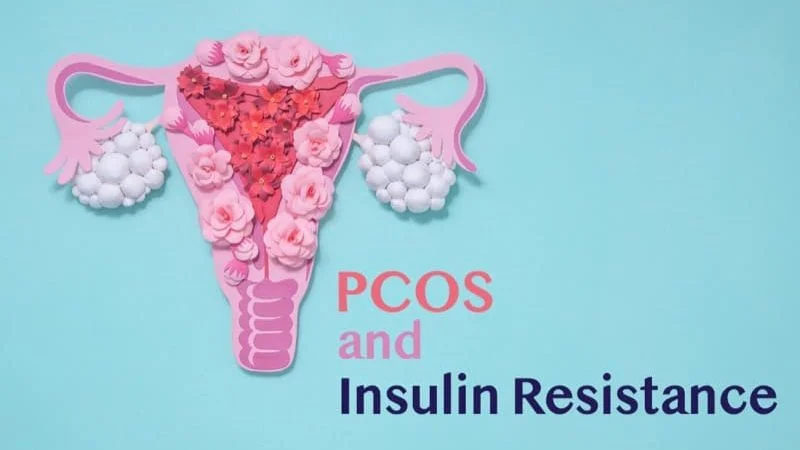
Understanding Insulin Resistance in PCOS and How to Reverse It Naturally
Polycystic Ovary Syndrome (PCOS) is more than just irregular periods or acne. At its root, insulin resistance plays a major role in how PCOS affects the body — from weight gain to infertility, and even increasing the risk of type 2 diabetes.
At Hera Clinic in Punawale, Dr. Sairandhri Kate-Shinde empowers women with PCOS to understand their condition, manage it holistically, and prevent long-term complications. In this blog, we’ll break down:
- What insulin resistance is
- Why it’s so common in women with PCOS
- How it affects your metabolism
- And most importantly — how to reverse it naturally and reduce your risk of diabetes
What is Insulin Resistance?
To understand insulin resistance, let’s start with insulin itself. Insulin is a hormone produced by the pancreas that helps move glucose (sugar) from the bloodstream into your cells, where it’s used for energy.
But when your body becomes insulin resistant, your cells stop responding to insulin properly. As a result:
- Your pancreas has to release more and more insulin to do the same job
- Blood sugar levels start to rise
- Excess insulin triggers fat storage, especially in the belly area
- It becomes difficult to lose weight or control cravings
Over time, this resistance can progress to prediabetes or type 2 diabetes, especially if left unmanaged.
Why is Insulin Resistance Common in PCOS?
Insulin resistance affects up to 70% of women with PCOS, even those who are not overweight. But why? The connection lies in hormones:
- High insulin levels stimulate the ovaries to produce more androgens (male hormones)
- This hormonal imbalance leads to symptoms like irregular periods, acne, hair thinning, and weight gain
The more weight you gain, the worse insulin resistance becomes — creating a frustrating vicious cycle. It’s not your fault. But it is something you can take charge of.
How Insulin Resistance Affects Metabolism
Insulin resistance leads to a slower metabolism, making it harder to burn calories efficiently. Here’s how:
- Your body stores more fat, especially around the abdomen
- You experience more hunger and cravings due to unstable blood sugar
- Fatigue and energy crashes become common
- Weight loss becomes difficult despite exercise or dieting
Without intervention, this can lead to metabolic syndrome — a cluster of conditions that includes high blood sugar, high cholesterol, and high blood pressure.
How to Improve Insulin Sensitivity & Prevent Diabetes Naturally
Here’s the good news: insulin resistance is reversible — especially when caught early. With the right lifestyle changes and medical support, you can improve metabolism, balance hormones, and reduce your risk of diabetes.
1. Prioritize a Low-GI, Whole Food Diet
What you eat has a direct impact on your blood sugar and insulin levels. Focus on:
- Low glycemic index (GI) foods: oats, lentils, quinoa, barley, sweet potatoes
- Non-starchy vegetables: spinach, broccoli, bell peppers, carrots
- Healthy fats: almonds, flaxseeds, chia seeds, olive oil
- Lean protein: eggs, chicken, paneer, tofu
Avoid: white rice, white bread, sugar-sweetened beverages, processed snacks, fried foods, sugary cereals and packaged “diet” products.
💡 Tip: Eat protein and fiber with every meal to reduce sugar spikes.
2. Move Your Body Daily
Exercise helps your cells respond better to insulin, even if you don’t lose a lot of weight. Best exercises for insulin resistance:
- Strength training: builds muscle and improves insulin use
- Brisk walking or cycling: boosts fat burning and improves insulin sensitivity
- Yoga & stretching: helps manage cortisol (stress hormone), which impacts insulin
Even 30 minutes a day, 5 days a week, can make a significant difference.
3. Sleep 7–8 Hours a Night
Sleep deprivation disrupts insulin and hunger hormones, increasing cravings and blood sugar levels.
- Avoid screens before bed
- Create a calming bedtime routine
- Don’t eat heavy meals late at night
4. Manage Stress Levels
Chronic stress triggers cortisol, which worsens insulin resistance and belly fat. Try:
- Deep breathing exercises
- Guided meditation
- Nature walks or journaling
- Adequate breaks during work
5. Get Regular Checkups & Blood Tests
Insulin resistance can be present even if your fasting sugar is normal. At Hera Clinic, we recommend regular monitoring of:
- Fasting insulin and glucose
- HbA1c (3-month average sugar)
- Lipid profile
- Hormonal panel
This helps in creating a customized treatment and prevention plan.
How Hera Clinic Can Help You
- Hormonal and metabolic evaluations
- Personalized lifestyle and diet plans
- Fertility support if you’re trying to conceive
- Regular monitoring and compassionate care at every step
We don’t just treat the symptoms — we help you heal from within.
Final Thoughts
Insulin resistance may be a key driver of PCOS, but it’s not a life sentence. With the right approach, you can improve your metabolism, balance your hormones, and prevent diabetes — naturally and sustainably.
Take the first step toward better health today. Let Hera Clinic be your partner in the journey.
📍 Visit Hera Clinic in Punawale
Dr. Sairandhri Kate-Shinde (MBBS, DNB, OBGY, FMAS)
Consultant Obstetrician, Gynecologist & PCOS Expert
📍 Shop No. 8, Ground Floor, Infinity Cube, D-Wing 44/1/2,
Malwadi, Punawale 411033
🌐
www.heraclinics.in
